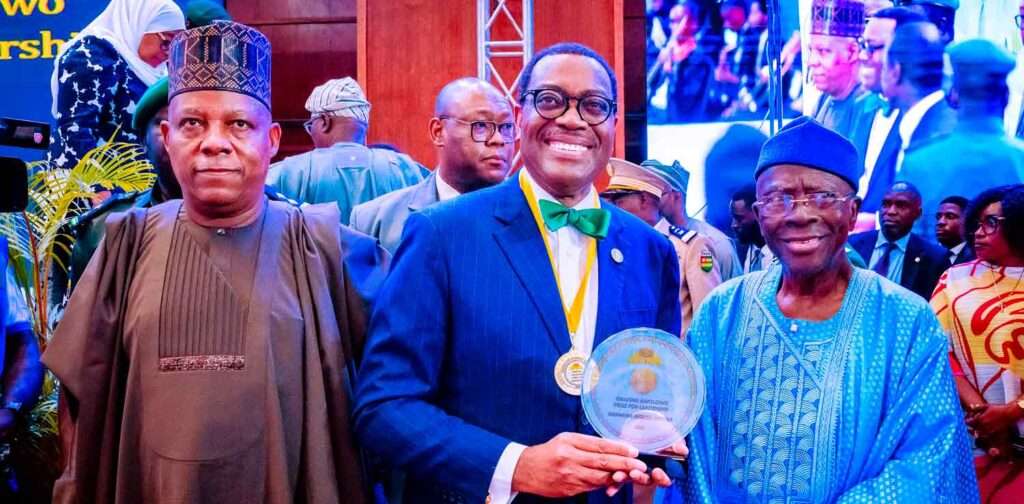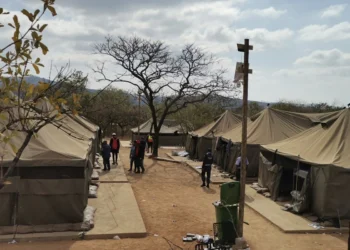President of the African Development Bank Group (AfDB) Dr. Akinwumi Adesina has appealed to leaders in across Africa to make poverty history as he outlined a compelling case for welfarist policies and people-centred development.
According to Dr Adesina, given the high levels of poverty in Africa, what is needed are welfarist policies that exponentially expand opportunities for all, reduce inequalities, improve the quality of life of people. Dr Adesina made this known at the Awolowo Foundation’s annual lecture on ‘Making a New Nigeria: Welfarist Policies and People-Centred Development.’
In his lecture, Dr Adesina identified five critical areas that Nigerian and African leaders need to focus on transforming their economies and people’s lives: The transformation of the rural economy and food security, health security for all, education for all, affordable housing for all and government accountability and fiscal decentralisation for a true federalism.
Transforming Rural Economies, Ensuring Food Security For All
Adesina noted that a better Africa must start with transforming rural economies saying, “that is because some 70% of the population lives there. Rural poverty is extremely high. At the heart of transforming rural economies is agriculture, the main source of livelihoods.”
“When rural economies falter, nations falter,” Adesina warned, “this leads to the spread of anarchy and terrorists who take advantage of the economic misery to entrench themselves.” He highlighted how the African Development Bank Group is supporting a farm revolution at scale across the continent.
“We have invested over $8.5 billion in agriculture in the past seven years which has impacted 250 million people. The African Development Bank and development partners are providing $1.4 billion for the development of 25 Special Agro-Industrial Processing Zones in eleven countries.”
Dr. Akinwumi Adesina
In Nigeria alone, the Bank is developing these zones in eight of the country’s 36 states with $518 million. Another $1 billion will go into the second phase of the program which will cover 23 more states. “Nigeria needs health care for all. Smart governments provide universal basic health coverage for their citizens.” said Adesina.

Dr Adesina spoke about how sicknesses and diseases cost Africa $2.6 trillion in lost productivity. He also recounted how the Covid-19 pandemic caught Africa unprepared, unprotected and left at the bottom of the ladder when it came to the distribution of vaccines.
Dr Adesina explained the various initiatives the Bank Group introduced to address Africa’s health needs including a $10 billion facility to support countries to cope with the pandemic; a $3 billion program to revamp Africa’s pharmaceutical industries and the recent launch of the African Pharmaceutical Technology Foundation to support access to proprietary technologies from global pharmaceutical companies.
“This will require ensuring that no citizen travels more than a few kilometers to find a health care center. The widespread use of mobile health centers, e-health facilities, the digitalization of health systems, especially in all primary health care centers, health insurance policies for all, including innovative micro-health insurance pay-as-you-go systems, will capture the bulk of the population that is in the informal sector.”
Education for All
Dr Adesina wants Nigeria to provide education for all. According to the United Nations Children’s Education Fund (UNICEF), Nigeria accounts for 15% of the total population of out-of-school children which includes over 10.2 million at the primary school level and 8.1 million at the Junior Secondary School.
“This is not a gold medal Nigeria should be proud of wearing,” he said and expressed concern about “the poor funding of universities, lack of basic infrastructure, poor incentives for lecturers and incessant strikes due to wage disputes, have almost crippled the university system”.
Dr Adesina gave an example of the Bank Group’s investment of $614 million in Nigeria’s IDICE program to support the development of digital and creative enterprises. The program is expected to create 6.3 million jobs and add an estimated $6.4 billion to the economy of Nigeria.
Adesina iterated and told the guests that welfarist policies are urgently needed to ensure all Nigerians have access to basic and affordable housing. He noted that according to data by the UN Habitat, 49 percent of Nigeria’s population which is equivalent to 102 million people, live in slums. He added that what people need is decent housing and not upgrading of slums. “There is nothing like a 5-star slum. A slum is a slum.”
READ ALSO: World Bank Approves $40 Million for Ghana, Other African Nations





















